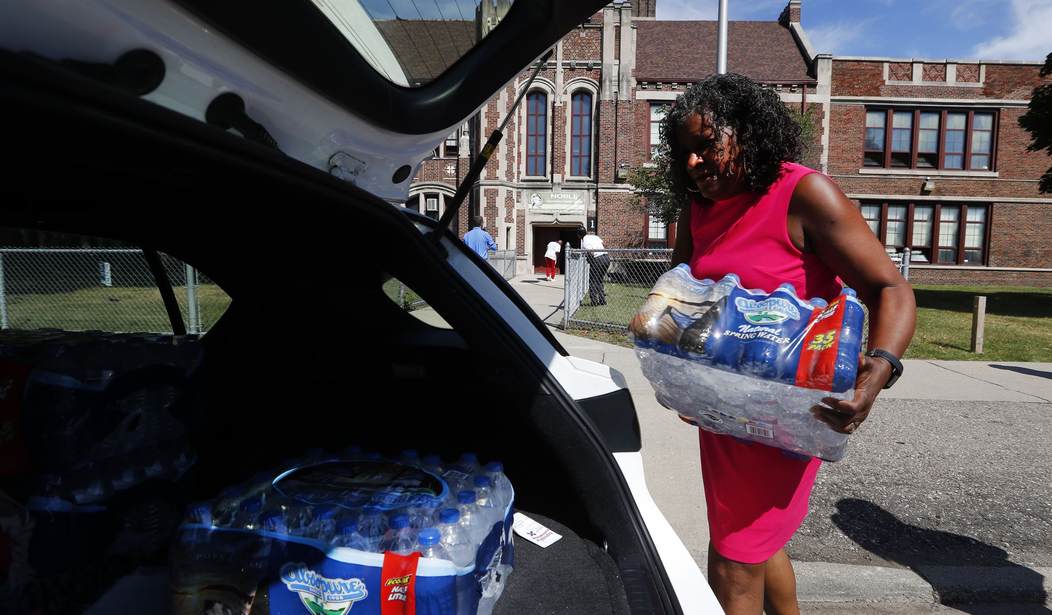Jackson, Mississippi is still in the midst of a severe water crisis, though conditions have reportedly improved a bit. Torrential rains caused the Pearl River to overflow its banks and overwhelm the area. Their water and sewage treatment plants were inundated and the city was placed under a boil-water advisory that was only lifted a few days ago. The waters have begun to recede, but residents still report that the water coming out of their taps is discolored and has a foul odor.
So what caused all of this mayhem? You might be tempted to blame it on the sudden, prolonged surge of rain. Or you could point the finger at the floods themselves or an inadequate drainage system. But according to “residents, politicians, experts, and activists” quoted by the Associated Press, you would be wrong. None of those things were the cause. Would you care to guess the real reason? If you said “racism,” give yourself a cookie.
Carey Wooten spent nearly seven weeks hunting for safe drinking water for herself, her two children and three dogs after clocking out each day as a Taco Bell manager, so Gov. Tate Reeves’ announcement that the water is clean again in Mississippi’s capital came as welcome news.
But the crisis in the city of Jackson isn’t over, even if its boil-water advisory was lifted on Thursday. While the state plans to stop handing out free bottled water at sites around the city Saturday night, the city said water pressure still hasn’t been fully restored, and state health officials said lead in some pipes remains so worrisome that pregnant women and young children should still use bottled water…
How did this happen? Residents, politicians, experts and activists say systemic racism is the root cause.
Yes, because of course it is. Systemic racism is at the heart of all of America’s ills, so why not a once-in-a-century flood, right?
The root of all of these problems began back in the 1980s according to this analysis. That’s when Jackson’s schools were racially integrated. There was an immediate surge of “white flight” as Jackson’s white residents moved to the suburbs or out of the area entirely. Middle-class working Black families who could afford to do so followed them. Municipal revenue plunged as crime soared and property values (along with property tax revenue) dropped. Jackson no longer had enough productive, taxpaying citizens to fuel the needs of a city and maintenance of public infrastructure including sewage and water treatment declined.
Some of the quoted commentators are claiming that the water outages and sewer issues are “disproportionately impacting communities of color.” That may indeed be true, but a quick glance at Jackon’s demographic information will inform you that the city’s population is currently 80% Black. I’m not sure the impact is “disproportionate” when communities of color comprise nearly the entire city. Anything that happens for better or worse will impact a majority of that size.
As many observers are pointing out, the public water system in Jackson has been in decline for years and everyone knew it. State and federal grants were awarded to bring things back to a functional level, but the money somehow never seemed to be enough. All it was going to take was one serious weather event to push the system past the brink and this summer that event arrived.
So with all of that in mind, was this crisis caused by racism? Or was it caused by administrative incompetence and a failure to properly prioritize municipal spending? Most of the “white flight” in question took place more than 40 years ago. A significant portion of the current residents weren’t even born yet then. And as the headlines reveal, none of this was a secret. The city’s infrastructure had been failing for a generation at least and the most that was done amounted to fiscal bandaids on a far more serious wound.
All cities struggle with their budgets. There is always a greater demand for services than the available revenue can support. But every city has to find a way to prioritize the fundamentals required to keep people alive before anything else. There has to be potable water, a stable power grid, and transportation allowing people to stock their pantries. If you can’t supply those three things, you no longer have a city. You have a disaster waiting to happen. And that’s what happened to Jackson.
Is it too late? Is there any way back from the current crisis conditions? Perhaps. But the city needs new leadership that is up to these types of challenges and a plan to attract more well-paying jobs into the city. State and federal grants or loans may get the water system back to the point where it can limp along again, but Jackson needs a complete overhaul and that’s going to require a lot of money. The city can’t go on in perpetuity existing on governmental bailouts. They either need to rebuild the municipal business environment or lock the doors and let the population move to other areas.








Join the conversation as a VIP Member